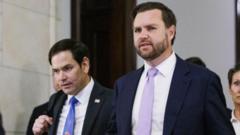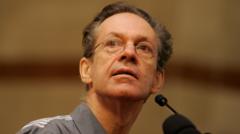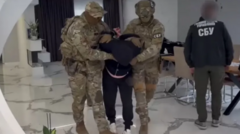Alarming implications arise as critics call for investigations into potential breaches of protocol and security within the Trump administration.
Trump Administration's Sensitive Chat Leak Raises National Security Concerns

Trump Administration's Sensitive Chat Leak Raises National Security Concerns
A slip in communication protocols has sparked outrage after a group chat among top officials discussing military action in Yemen was accidentally exposed to an influential journalist.
In a shocking revelation, a group chat involving senior officials from the Trump administration discussing a planned U.S. military strike in Yemen was reportedly observed by prominent political journalist Jeffrey Goldberg of The Atlantic. The chat, conducted on the encrypted messaging app Signal, was inadvertently accessed by Goldberg after White House National Security Adviser Michael Waltz mistakenly added him to the conversation.
The leaked exchange included conversations among key figures such as Vice-President JD Vance, CIA Director John Ratcliffe, Defense Secretary Pete Hegseth, and White House Chief of Staff Susie Wiles. A spokesperson for the National Security Council confirmed the authenticity of the message thread, which provided a rare glimpse into the inner dynamics of the Trump administration's national security team.
Goldberg detailed in an article that once the U.S. carried out its military operation against Houthi targets on March 15th, Waltz praised the team with messages that included celebratory emojis, drawing immediate attention to the breach of operational security.
Criticism was swift and bipartisan. Senator Mark Warner, a Democrat from Virginia, condemned the administration's handling of classified communications, suggesting that such oversights jeopardize national safety. On the Republican side, Congressman Don Bacon also expressed dismay, affirming that sensitive discussions should not occur over unsecured channels, noting potential vulnerabilities from adversaries like Russia and China.
With the Republicans holding a majority in Congress, any formal inquiry into this situation would require their initiation, but House Speaker Mike Johnson seemed to take a lax stance, indicating that the White House admitted their mistake which would lead to tightened security protocols.
In a press conference, former President Trump claimed to be unaware of the situation at hand, defending his national security team while rumors of possible resignations swirled, specifically targeting Waltz for his part in the blunder. As the administration focuses on the success of the strikes, the fallout from this incident may have implications for Trump's governance and national security approach.
Moreover, internal disagreements were revealed, with Vance expressing his concerns about the military action and hinting at a possible disconnect between the administration's public and private stances on foreign policy matters, which has historical precedent in presidential administrations.
As scrutiny continues, the Trump administration faces mounting pressure to address accountability and security in communications, especially given past controversies surrounding classified information handling that have plagued both this and previous administrations. Clinton expressed incredulity at the situation, echoing broader public and political concerns over secure handling of sensitive information.
The leaked exchange included conversations among key figures such as Vice-President JD Vance, CIA Director John Ratcliffe, Defense Secretary Pete Hegseth, and White House Chief of Staff Susie Wiles. A spokesperson for the National Security Council confirmed the authenticity of the message thread, which provided a rare glimpse into the inner dynamics of the Trump administration's national security team.
Goldberg detailed in an article that once the U.S. carried out its military operation against Houthi targets on March 15th, Waltz praised the team with messages that included celebratory emojis, drawing immediate attention to the breach of operational security.
Criticism was swift and bipartisan. Senator Mark Warner, a Democrat from Virginia, condemned the administration's handling of classified communications, suggesting that such oversights jeopardize national safety. On the Republican side, Congressman Don Bacon also expressed dismay, affirming that sensitive discussions should not occur over unsecured channels, noting potential vulnerabilities from adversaries like Russia and China.
With the Republicans holding a majority in Congress, any formal inquiry into this situation would require their initiation, but House Speaker Mike Johnson seemed to take a lax stance, indicating that the White House admitted their mistake which would lead to tightened security protocols.
In a press conference, former President Trump claimed to be unaware of the situation at hand, defending his national security team while rumors of possible resignations swirled, specifically targeting Waltz for his part in the blunder. As the administration focuses on the success of the strikes, the fallout from this incident may have implications for Trump's governance and national security approach.
Moreover, internal disagreements were revealed, with Vance expressing his concerns about the military action and hinting at a possible disconnect between the administration's public and private stances on foreign policy matters, which has historical precedent in presidential administrations.
As scrutiny continues, the Trump administration faces mounting pressure to address accountability and security in communications, especially given past controversies surrounding classified information handling that have plagued both this and previous administrations. Clinton expressed incredulity at the situation, echoing broader public and political concerns over secure handling of sensitive information.























